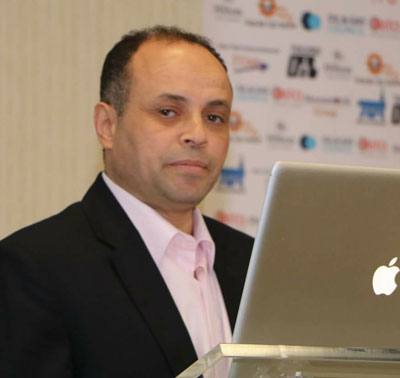Engr Emmanuel Sagoe Paintsil
Reservoir Engineer
- 8 year Industry Experience.
- Current Work – Cementing Technical Professional, Halliburton Ghana – 7 years.
- Reservoir Engineering Facilitator
After a slow start, the oil and gas industry seems to be eager to adopt all sorts of digital technology as they help companies keep costs lower while boosting efficiency. Artificial intelligence is being flaunted as the answer to all problems or, at least, a better answer to many problems than older approaches. And it is maturing.
First of all, it needs to be said that a lot of the people who talk about AI enthusiastically do not mean artificial intelligence literally, as in an autonomous system capable of making decisions on its own. What they most commonly mean is predictive and analytic algorithms, and the process that allows for the deployment in a huge variety of tasks in the upstream industry: machine learning.
While the hype is considerable, it’s not all without merit. The co-founder and chief executive of oiltech statup OilX, Florian Thaler, told Oilprice that “amidst the general hype, there is indeed an epochal shift: the current exponential growth in oil data from sensors and satellite is unprecedented and is not showing any signs of slowing down.”
But this data has to be clean and high-quality, Thaler explains. Once the quality and reliability of data collected are good enough, the data can be used to create a whole platform based on machine learning that effectively works as a digital oil analyst. And this is just one application of machine learning, often inaccurately referred to as AI.
Some believe 2019 is the year that will mark AI’s advance to practice from theory. One of these optimistic experts is Jan Ren, the chief executive of software developer Atomiton.
Ren told Forbes’ Mark Venables that “The biggest thing that will impact you as a company is that AI is going to go from theory to practice. So far it has been mostly theoretical, but people don’t understand how to do it and what it can do. I think now people understand its potential and more projects are being fulfilled and implemented. The infrastructure industry will start to push AI from the how, the technical, to the what, which means AI will be recognized by the problems it has solved instead of what data it collects.”
This is quite general as far as forecasts go, but here’s something rather more specific: machine learning can be deployed in more than one area of the industry. In the field, for example, it can help oil and gas producers see how a well’s yield will change over time.
“We have a lot of data points and we assume that if the well has produced long enough it will behave as other wells have performed in the past. … A neural network is a way that allows us to do this in some way,” Rystad Energy senior analyst on shale Alexandre Ramos-Peon recently told EPMag’s Velda Addison. He added, however, that “This technique only seems to work for wells that have a sufficiently long production forecast.”
This makes perfect sense, of course: the more historical data you have, the more accurate predictions for future well performance you could make, especially if you have the help of algorithms. And these algorithms are now so sophisticated, according to Ramos-Peon, that “You just throw all of this data to the computer and it will train itself somehow to guess the best value so the accuracy is as high as possible.”
The AI market in oil and gas has been estimated to reach US$2.85 billion by 2022, growing by a compound annual growth rate of 12.66 percent. No wonder, given how quickly the technology evolves and how many applications it could have in oil and gas.
Ren believes next year will demystify the concept of artificial intelligence as adoption expands and trust towards the concept grows along with understanding of how it works. Of course, this development is by no means risk-free: cybersecurity is just as much a problem in oil and gas—of not more—as in any other industry.
Purchase the HSE in Oil and Gas application form at our Accra, Ghana Office
Cost of Application Form: US$50 (GHS800).
Office Address:
GOOGPro Ghana, GNPA Building Room 260 at Kokokomlemle, Near ATTC and Star Assurance, Accra.
Digital Address: GA – 0724744 Ghana.
Call +233 55 248 4485 or WhatsApp +233 54 159 5804
Completed application form must be scanned and submitted to careers@googpro.org on or before May 05, 2025; for training program starting May 12, 2025 and June 04, 2025;
for training program starting June 11, 2025.
Training and certification fee is US$600
Field work starts July 01, 2025 and August 01, 2025 respectively
Engr Emmanuel Sagoe Paintsil
Reservoir Engineer

Dr. Ahmed Zakaria Noah
PhD Petrophysics (Waseda University), M.Sc in Petroleum Geology, B.Sc in Geolog has accumulated 15 year of successful work experience in Oil and Gas drilling wells and well site Geologist, Data Engineer, Mud Logging Coordinator, Reservoir Engineer, Survey Engineer, worked in the areas of hydraulic fracturing in tight-gas reservoirs, MWD, Senior LWD Engineer, Direction Engineer along strong experience in Open Hole Logging Interpretation throughout overseas with different clients in different country locations.

Publications:
Mohamed A. Kassab and MostafaG.Temraz and A. Nooh: Preliminary Study of Capillary Pressure Derived Parameters: Lower- Middle Miocene- San El Hagar-1 well, East Nile Delta, Egypt. EPRI, Nasr City, Cairo, Egypt British University, Cairo, Egypt, 2012. Egy.J. Appl. Geophys., Vol. 11, No. 2, 201-217, 2012.
A.Z. Noah: Optimizing Drilling Fluid Properties and Flow Rates for Effective Hole Cleaning at High- Angle and Horizontal Wells, Journal of Applied Sciences Research, 9(1): 705-718, 2013
A.Z. Nouh, Mostafa Gouda Temraz, and El-Abbas Moustafa: Evaluation of Seepage Oil from Source Rock in the Southern Gulf of Suez, Egypt, 2013.Egy. J. Appl. Geophys., Vol. 11, No. 2, September 2012, 201-217
El-Abbas Moustafa, Ahmed Noah, and Adel Salem: Evaluation and Analysis of Oil Shale in Quseir-Safaga and Abu Tartur Western Desert, Egypt, 2014, Scirp-JSEMAT-1180219-20140316204601.
Ahmed Noah; Mostrfa Gouda Temraz and El-Abbas Moustafa EVALUATION OF SEEPAGE CRUDE OIL FROM SOIJRCI, ROCK IN TIIE SOUTI{ERN GULF OF SIIEZ, EGYPT, oI AppLS cL,28( 12)2 013.
Noah2, A., And Fathelbab3, S Pre-Drill Pore Pressure Prediction Using Seismic Velocities Aboashor1, N., El-Werr1, A. Egyptian Journal Of Geology, V. 58, 2014, P. 104-115, 2014. Pore Pressure Gradient Estimation Using The Modified D-Exponent Technique In El-Arish Area, North Sinai, Egypt. Aboashor1, N., El-Werr1, A., Noah2, A., And Fathelbab3, S. Egyptian Journal Of Geology, V. 58, 2014, P. 117-126.2014
Enhancement of yield point at high pressure high temperature wells by using polymer nanocomposites based on ZnO & CaCO3 nanoparticles., A.Z. Noah, M.A. El Semary b, A.M. Youssef c, M.A. El-Safty, Egyptian Journal of Petroleum (2016).
Using Nanomaterials to optimize Mud Rheology at HPHT wells throughout experimental work. A.Z.NOAH1, M.A.ElSemary2, A. M. Youssef3and M.A.EL- SAfTY4, International Journal of Innovative Research & Development, ISSN 2278 – 0211, Vol 5 Issue 4, www.ijird.com.
Reduction of Formation Damage and Fluid Loss using Nano-sized Silica Drilling Fluids, Adel M. Salem Ragab, and Ahmed Noah, Petroleum Technology development Journal.
A.Z. NAOH :Formation Evaluation and Lithology Determination for selected wells at Aghar Field, Western Desert, Egypt, , www.ijird.com May, 2016 Vol 5 Issue 6, ISSN 2278 – 0211 (Online), 2016.
Dr. Ahmed Nooh, PhD1, Dr. Carlos Monroy, PhD2, Michael Anwr Alphonse Anees, BS1, and Wafik Girgis, BS1: A Proposed Design for a Smart Shock Absorber Using an Electro-Rheological Fluid , 14th LACCEI International Multi-Conference for Engineering, Education, and Technology: “Engineering Innovations for Global Sustainability”, 20-22 July 2016, San José, Costa Rica. 2016.
Moataz Kh. Barakat (1)and Ahmed Z. Noah (2) Reservoir Quality Using The Routine Core Analyses Data of Abu Roash “C” in Badr El Din-15 Oil Field, Abu Gharadig Basin, North Western Desert, Egypt, 2016.
Nana Osei Kuffour Poku has over 10 years in the oil and gas industry specifically in drilling solutions, well construction and maintenance. He holds MSc Oil & Gas Engineering from Robert Gordon University, Aberdeen, Scotland. BSc Petroleum Engineering, KNUST, Ghana (West Africa). He worked at National Oilwell Varco (NOV), from 2012 – 2018 as drilling solutions engineer & account manager. He currently works at GNPC as a Petroleum Engineer. He is a member of SPE, Energy Institute and AGOGPro.
Send the following details to careers@agogpro.org
Mr Larry Wolfson has 34 years experience in planning and supervising and well construction, including ERD, slim-hole and subsea wells. He received a BS in mechanical engineering from California State University Northridge, an MS in petroleum engineering from the University of Tulsa, and he is a registered petroleum engineer in California.


